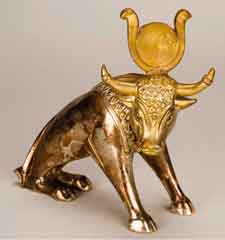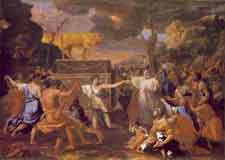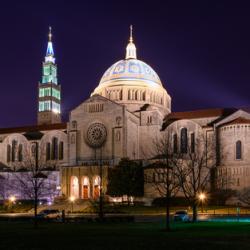By Alexei Laushkin
 At first glance, old-fashioned idolatry, it would seem, has fallen out of fashion in this age. The idea that someone would spend his time and energy making a graven image to place at the center of his home seems a bit absurd, even foolish.
At first glance, old-fashioned idolatry, it would seem, has fallen out of fashion in this age. The idea that someone would spend his time and energy making a graven image to place at the center of his home seems a bit absurd, even foolish.
Imagine an urbanite rushing, in his four-door sedan, to the nearest forest to chop down the strongest and tallest tree in order that he might spend the rest of his day carving out his own image. The man takes the oversized tree and ties it to the top of his poorly suited car. He takes the tree home and spends the rest of the afternoon disturbing his neighbors only to come out with a few one to two foot images of himself. The man proceeds to take these images and place them throughout his house. The image is used for regular praise and worship, and is a constant reminder of his trust in these gods he has created.
Even more foolish if that same man spent his days selling these images for the comfort and good fortune of others. Foolishness we would say! The height of absurdity! In today's culture such people would be fools, maybe newsworthy fools, and if done en masse certainly a YouTube sensation, but still such people would be largely dismissed. After all, who would spend all their waking hours seeking the comfort and praise of a hallowed image??
It reminds me of a catchy tune put to Psalm 20:7, "some trust in chariots, some trust in horses." Or if you prefer you can take it in with the lyrics of this 1994 song from Steve Green:
As catchy as the song is, modern idolatry is a serious and deadly business.
Isaiah 44:17 puts the desperation and emphasis rather adequately, when the idol worshipper declares of a self-made image, "Deliver me, for you are my God!" Stark enough. Idolatry betrays the reality of the spiritual death that overpowers the individuals. From dust to dust. You become what you worship.
Idolatry animates this age and feeds the environmental crisis. We have fashioned for ourselves golden calves in money, fame, power, sex, and prestige. Calves that animate modern life. These idols do a funny thing to the modern man; they force him to consume more and more gadgets and trinkets to ordain self-made temples, to make these empty temples appear to be more holy than hallowed; a place to be desired rather than abhorred.
This idolatry does not just impact the rich and wealthy, but permeates all of life. It can be seen from our greatest halls of power to the billboards that adorn our highways and byways. We have fashioned for ourselves an image of ourselves to worship and we desperately work to keep those images as close to home as possible. They line our bookshelves, occupy our movie collections, adorn our tables, and make their homes in our hearts. They overflow into our closest relationships and frame our working relationships. They are what we spend hours of toil and work to obtain and without them we cannot imagine how/what would occupy our time.
 For those of us who care about the environment, there is a real and substantial cost to these idols. There is no place on earth where our (meaning mankind's) worship is not felt. We stride the world like a colossus looking for the next place to feed our appetite. It's a rather unseemly process that impacts families, communities, geopolitics, and the health and realm of nations.
For those of us who care about the environment, there is a real and substantial cost to these idols. There is no place on earth where our (meaning mankind's) worship is not felt. We stride the world like a colossus looking for the next place to feed our appetite. It's a rather unseemly process that impacts families, communities, geopolitics, and the health and realm of nations.
Take modern China, a nation that straddles the globe looking for more oil in Sudan, zinc from Australia and Peru, and copper from the Congo to feed its growing economic and material needs. Even unsavory dictatorships like Iran are courting Chinese money, for they understand that the human need for the material world is insatiable.
We rejoice when this sort of worship unintentionally lifts millions out of poverty, but as Christians we must pray that we not deliver people out of material poverty only to damn them to an everlasting spiritual poverty, one from which they may never recover.




